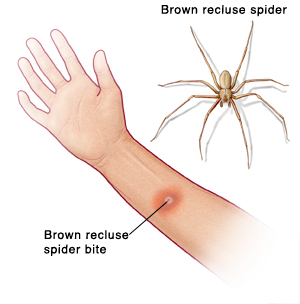Most spiders are harmless to people. But there are 2 spiders in the U.S. that can cause harm: the black widow and the brown recluse. People bitten by a black widow or brown recluse spider should get medical care right away.
Brown recluse spiders may be light or dark brown. They are ¼ inch to ¾ inch long, and have long, thin legs. Some have a fiddle-shaped mark on their back. They are most often found in the South, West, and Midwest. They live in dark, quiet places, such as closets, attics, basements, porches, barns, and woodpiles.
A brown recluse spider bite may be painless at first. Or it may burn slightly like a bee sting. A small, red mark may form at the site. Then small blisters may appear. In 2 to 8 hours, the area may become painful, swollen, and itchy. Other symptoms can include a general feeling of discomfort, fever, joint pain, nausea, and vomiting. In most cases, the bite heals on its own in a week. But in some cases, the skin at the bite site may break down. For instance, the skin may turn black and sink down as the tissue below dies. This can cause an open wound called an ulcer to form. It may take a few weeks to a few months to heal. In rare cases, a brown recluse spider bite leads to more serious problems. These can include muscle damage, kidney failure, problems with blood clotting, and coma.
The bite site will be cleaned. You may get pain medicines and antibiotics. You may get a tetanus shot. If an ulcer forms and causes severe damage to the skin, you may need skin grafting. But most bites heal without scarring.
Home care
-
You may use acetaminophen or ibuprofen to relieve pain, unless another pain medicine was prescribed. Talk with your health care provider before using these medicines if you have chronic liver or kidney disease. Also talk with your provider if you've ever had a stomach ulcer or digestive tract bleeding.
-
If you were prescribed antibiotics, take them exactly as directed. Be sure to complete the medicines.
-
Care for the bite site as directed by your provider. This may include cleaning the wound at least once a day with soap and water.
-
To help ease pain and swelling, apply cold packs to the bite site. You can use a cool, wet washcloth. Or you can make a cold pack by putting ice cubes in a plastic bag. Then, wrap the bag in a thin towel. Don't put ice directly on the skin.
-
If you were bitten on the arm or leg, keep the area raised. Swelling may get worse in the down position.
-
Check the bite site daily for signs of infection (see below).
Follow-up care
Follow up with your health care provider as advised.
When to call your health care provider
Call your health care provider right away if:
-
You have fever of 100.4°F (38°C) or higher, or as advised by your provider.
-
Pain gets worse and is not relieved with medicine.
-
You have signs of infection at the bite site, such as increased redness or streaking, swelling, or bad-smelling discharge.
-
The bite site turns black or blue.
-
The bite site won’t heal or gets bigger.


